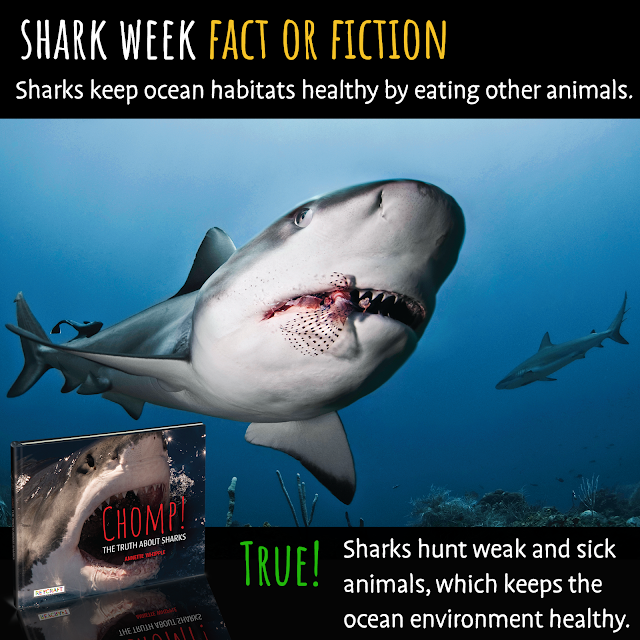Sharks are one of the most misunderstood animals on the planet, (mostly thanks to the movie Jaws--which was a book first and even some of the hype around Shark Week). But I want to celebrate the truth about sharks! They're amazing! One way we can respect sharks is to learn more about them.
1. Some sharks have belly buttons.
Sharks are fish, and some lay eggs, but not all shark species lay eggs. Pups born in the lemon shark family are actually born alive instead of hatching from eggs. Since lemon shark pups are connected to their mothers with an umbilical cord, they have a scar like a belly button.
2. You're not shark food.
Despite what the media implies, sharks are not brutal monsters out hunting humans. However, in nearly 40% of "shark attack" news stories, the shark never TOUCHED the person. (But any shark report gets attention and the media loves attention.)Yes, sharks do sometimes bite people. And a single bite from a shark can be devastating--or even deadly. Please remember sharks do not infest ocean waters. The ocean is their home.
3. Sharks don't breathe through their nostrils.
Sharks have nostrils, but they don't use them to breathe. Like other fish, sharks breathe through their gills. Different shark families have a different number of gills. Learn more about shark families with the Shark Research Institute.
4. Shark experts identify sharks by their teeth.
Every shark species has unique teeth. Just as human teeth are different on the bottom jaw and the top jaw, sharks' teeth also differ from their top and bottom jaws. When sharks are similar with some characteristics, their teeth distinguish them from others.
5. There are more than 500 kinds of sharks.
The diversity of sharks is amazing! They're fish, but they have cartilage skeletons (like skates and rays which are related to sharks) instead of bones. However, when you try to find the number of known shark species, you may find different numbers. Even updated research can conflict because of how different scientists categorize the subspecies. The Shark Foundation says there are 548 species of sharks.
6. Sharks come in all sizes.
The smallest shark is the dwarf lantern shark. It's about seven inches in size. That's about the size of an adult's hand--and the largest shark tooth. The largest shark to ever live is known as the megalodon. Their teeth could grow to be seven inches in length!
7. Humans need sharks.
Sharks keep oceans healthy. And people need healthy oceans. As apex predators, sharks are at the top of the food chain. And they eat all sorts of other animals--including sick and injured ones. That prevents the spread of disease. They also regulate the populations of other animals which keeps the ocean balanced with health and biodiversity. We need sharks.
8. Sharks need protection.
And sharks need our protection. The megalodon is extinct. About one-third of the remaining shark species are vulnerable or endangered. Shockingly, 34 species face "extremely high" risks of extinction in the wild. But 58 more species are also endangered according to the ICUN Red List (at the time of this writing).
9. The freckles on sharks' snouts are a sensory organ.
All living things give off pulses of electricity. And sharks have a supersense to detect electricity. This sensory organ is called the ampulla of Lorenzini and is located on the snouts of sharks. They look like freckles!
10. 1 in 11 million
The likelihood of a shark biting you is one in 11 million. If you've ever been in the ocean, you've likely been near a shark since the ocean is their home and many live in shallow waters. But you're not likely to be bitten by a shark.
Want to know more? My book Chomp! The Truth About Sharks is a question-and-answer book. The fact-filled book includes bold photographs and humorous illustrations.
Chomp! The Truth About Sharks is available wherever books are sold. Ask for it at your local bookstore or request your library to get it.
If you like this post, please consider signing up for my monthly author newsletter. Thanks!

















No comments